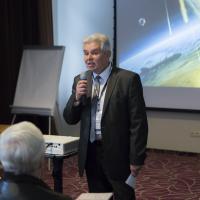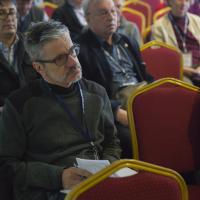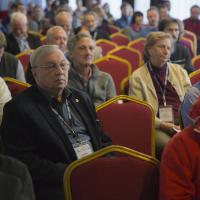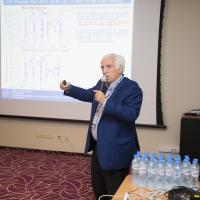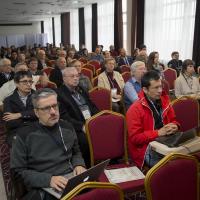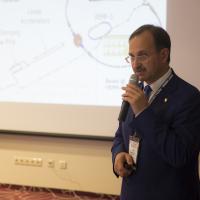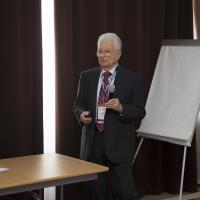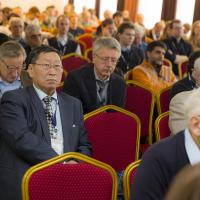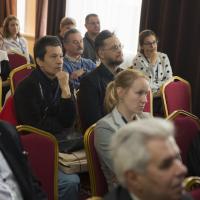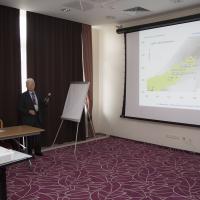The 3rd International Conference on Particle Physics and Astrophysics (ICPPA-2017), organized by the National Research Nuclear University MEPhI has ended in Moscow.
The scientific program of the Conference included presentations on nuclear physics, heavy ions, high-energy physics, astroparticle physics and neutrinos, gravitation and cosmology, and modern detection technologies.
Leading scientists from around the world took part in the discussion of the latest results of modern experiments and development of advanced detector technologies:
- CERN’s Director for Accelerators and Technology Frederick Bordry;
- Director of the Budker Institute of Nuclear Physics, RAS corresponding member Logachev P.V.;
- The head of the LHCb experiment in CERN Giovanni Passaleva;
- Chief researcher of the Laboratory of heavy quarks and leptons at LPI, RAS corresponding member Mizyuk R.V.;
- Chief researcher of the Laboratory of theoretical physics JINR, RAS corresponding member D. I. Kazakov;
- The head of the Laboratory of extragalactic radio astronomy, LPI, RAS corresponding member Kovalev Y.Y.;
- The Deputy Director of JINR, the head of the MEPhI Department of physics of extreme states of matter, academician Sharkov B. Yu.;
- Member of the STAR collaboration Council Olga Evdokimov;
- Scientific Director of the Laboratory of nuclear reactions, JINR, academician Yu. Ts.Oganesyan;
- The head of BOREXINO collaboration Gioacchino Ranucci;
- The coordinator for physical research in the ATLAS experiment Daniel Froidevaux;
- Director of IHEP, RAS academician Ivanov S.V.
According to the Professor of the MEPhI Department of elementary practice physics S.G. Rubin, this combination of different branches of physics is natural: “Formerly, scientists working in such diverse fields as astrophysics and particle physics could know nothing about each other, but the situation changed and now all kinds of physics are closely linked. For example, the discovery of the Higgs boson at the LHC and the study of its properties have found many applications in cosmology, it became clear that this particle could strongly affect the formation of our Universe.”
Astrophysics was and remains a very popular topic, which is now roused by a large number of discoveries made in connection with the active development and improvement of technology. A microcosm can be not so interesting for ordinary people, because direct observation of the particles is difficult, however, this area is the source of a large number of exciting features for specialists. “On the one hand it's clear that the Standard model of elementary particles is not complete, for example, the existence of dark matter and neutrino mass is contrary to it. The model must be expanded but at the moment it coincides with the observations, the experimental search for deviations has no result, model is precisely executed,” said Sergey Rubin.
This idea was supported by the head of the MEPhI Department of experimental nuclear physics and cosmophysics, and the main researcher of LPI, RAS academician M.V. Danilov, who noted interesting papers on the physics of heavy quarks. Now it has the great hints on the existing deviation from the Standard model, which is one of the pillars of modern elementary particle physics.
Turning to astrophysics, Danilov noted the report of the head of the Laboratory of Cosmology and Elementary Particles of the Novosibirsk State University, Professor A.D. Dolgov: "It has coincided that this year the Nobel Prize was awarded for the discovery in this area – long-predicted gravitational waves were opened. This is interesting not only because we’ve opened the phenomenon predicted in the general relativity theory and thus important, but it opens a new approach to the study of the universe, study of its structure. The fact that those black holes, that merged and gave the signal, had very large masses was a surprise. This is the opening of a new era in our capabilities of research of the universe.”
“I am very pleased that I know two of the three Nobel laureates. I worked for a very long time with one of them – Barry Berrish – at the creation of a detector for the supercollider in the USA, which, unfortunately, was not fulfilled. Another our trend is the preparation of future linear electron-positron collider, which has not been adopted yet. For some time Barry Barrish headed it, and I actively participated in it. I was very pleased to find that my friends had received the Nobel Prize. I’ve already congratulated them,” said Danilov.





